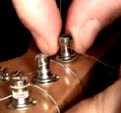 I’m Canadian, so I glaze over in most discussions of U.S. domestic policy. Accordingly, I have basically ignored the debate over Internet radio royalty rates. But my interest has increased after reading two well-reasoned opinions on how the debate bears directly on independent musicians.
I’m Canadian, so I glaze over in most discussions of U.S. domestic policy. Accordingly, I have basically ignored the debate over Internet radio royalty rates. But my interest has increased after reading two well-reasoned opinions on how the debate bears directly on independent musicians.
The first, in Business Week:
The outrage against the CRB rates isn’t fueled by concerns rooted in maintaining territory or corporate interest. It’s about the growth, development, and survival of both Internet radio and independent artists … It’s reasonable to assume that small broadcasters are more likely to be liberal in their allotment of airtime to independent artists. When July 15 rolls around, few smaller stations will survive, and as a result, fewer independent artists will receive royalty payments … When we support diverse broadcasting alternatives, we’re supporting the growth of independent music and the survival of niche-based genres that have become all but extinct on conventional corporate radio.
The second from an indie artist writing for The Baltimore Sun:
Because we aren’t regularly appearing on MTV, and American Idol’s Ryan Seacrest probably doesn’t know our names, Internet radio is one of our few real opportunities for exposure to large audiences. With more than 7 million Internet radio listeners every day – most of whom are tired of the redundancy they find on broadcast radio – the opportunities abound for the artists who before had very few.
If you’re as out of touch as I was, Digital Music News has a great round up of the main issues:
(1) Exactly what is the debate about?
The ongoing debate is focused specifically on streaming performance royalty rates in the United States effective January 1, 2006 through December 31st, 2010 (retroactive rates are being included in the current rate increase). It does not includes publishing royalties, which are defined by a separate process.
And Peter at CDM adds some thoughts:
Note the big attached “ifsâ€, which are vaguely worded in the official SoundExchange announcement, and sound all the more threatening given, according to SoundExchange, the previous rates are already in effect.
Tags: business

 For a full band mix, restringing your electric guitar probably won’t, by itself, much affect the overall sound of your recording. Especially if the guitar’s a little crunchy. Ditto for changing the snare drum head. Or tweaking the piano’s tuning.
For a full band mix, restringing your electric guitar probably won’t, by itself, much affect the overall sound of your recording. Especially if the guitar’s a little crunchy. Ditto for changing the snare drum head. Or tweaking the piano’s tuning. Music sales widgets are the Flash based “mp3 players with built-in music store” we see appearing across the web. SNOCAP is arguably the best known vendor, thanks to high profile deals with EMI and Myspace. But there are at least half a dozen other companies offering similar tools.
Music sales widgets are the Flash based “mp3 players with built-in music store” we see appearing across the web. SNOCAP is arguably the best known vendor, thanks to high profile deals with EMI and Myspace. But there are at least half a dozen other companies offering similar tools.